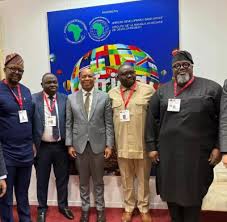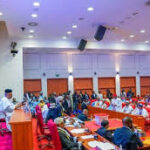Minister of Power, Chief Adebayo Adelabu, has reaffirmed Nigeria’s central role in shaping Africa’s energy landscape during high-level engagements at the 2025 Africa Energy Forum held in Cape Town, South Africa.
According to a statement by his spokesperson, Bolaji Tunji, Adelabu used the platform to highlight Nigeria’s balanced energy transition strategy, stressing that the country’s vast natural resources remain critical to national economic growth despite the global shift toward cleaner energy sources.
The minister participated in a closed-door ministerial roundtable where he presented Nigeria’s approach to aligning policy, regulation, and financing to drive energy sector efficiency and attract investment into key infrastructure. The session convened top public and private sector stakeholders to fast-track project execution and align private sector strengths with national priorities.
During a panel discussion on energy transition, Adelabu underscored Nigeria’s pragmatic path toward decarbonisation, asserting that while the country is committed to reducing carbon emissions, its hydrocarbon reserves are still essential to economic and energy stability. He noted that this position aligns with President Bola Tinubu’s broader national development vision.
“No energy transition plan can succeed without a coherent and well-structured policy framework,” Adelabu said, citing Nigeria’s newly approved National Integrated Electricity Policy as a strategic roadmap for harmonising power generation, transmission, and distribution, as well as expanding gas-to-power and renewable energy initiatives.
He outlined investment priorities including grid modernisation for improved reliability, greater integration of renewables, and decentralised energy solutions such as mini-grids and solar home systems.
“Nigeria is open for business across the full energy value chain – from hydrocarbons to clean energy,” Adelabu declared, sending a strong message to international investors.
On the sidelines of the forum, the minister held bilateral meetings with key stakeholders including South Africa’s Minister of Electricity and Energy, Dr. Kgosientsho Ramokgopa. Both leaders discussed the need for a united African voice in global energy platforms such as the G20 and explored opportunities for collaboration in power sector reforms, grid expansion, and regional energy integration.
Adelabu also met with the UK’s Deputy Trade Commissioner for Africa, Ben Ainsley, where discussions focused on strengthening energy partnerships. In meetings with the International Finance Corporation (IFC), the minister explored expanded support for Nigeria’s on-grid and off-grid electrification programmes.
Further engagements with Canada’s Ambassador and Siemens Energy representatives centred on trade opportunities and accelerating grid modernisation efforts.
Through these engagements, Adelabu reinforced Nigeria’s commitment to a resilient, inclusive, and sustainable energy future for both the country and the continent.
“Our goal is clear – energy access, sustainability, and shared prosperity for Nigeria and all of Africa,” the minister stated, rounding off a series of strategic discussions at the forum.









